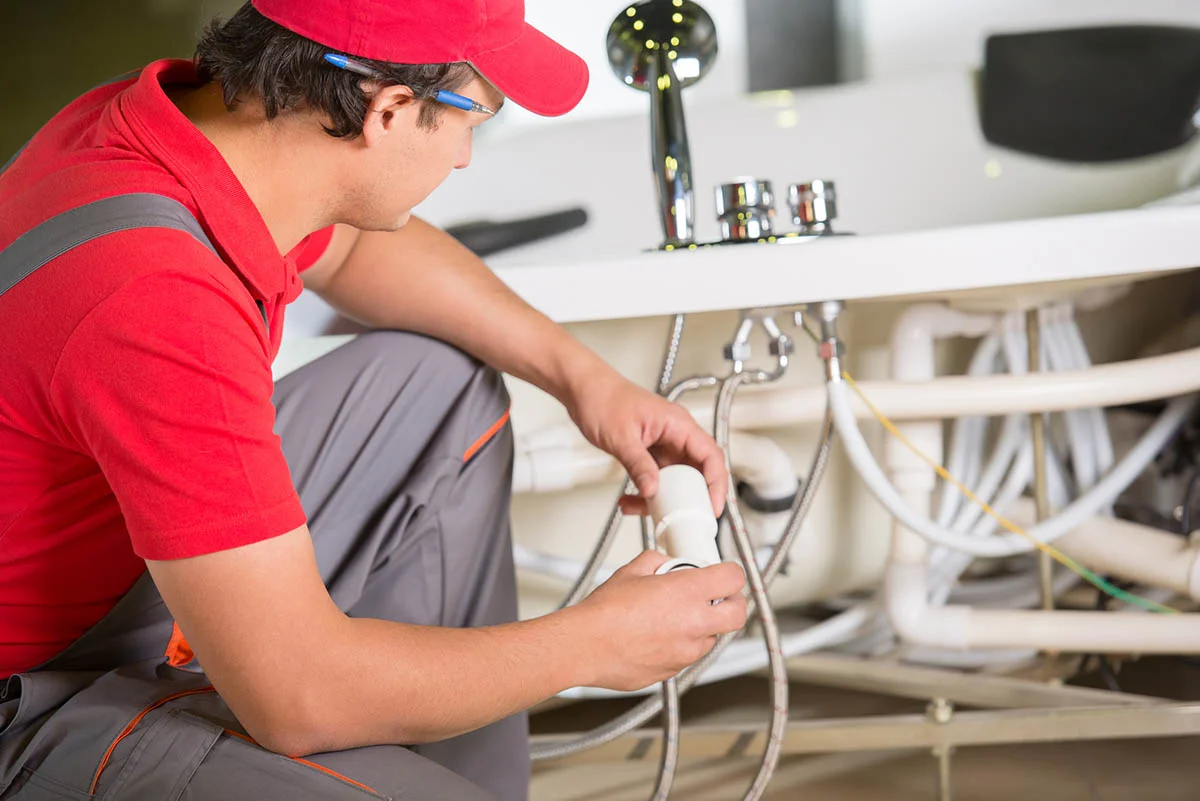Home>Home Maintenance>How To Market A Home Inspection Business


Home Maintenance
How To Market A Home Inspection Business
Modified: March 6, 2024
Get expert tips on how to effectively market your home inspection business. Enhance your home-maintenance services and attract more customers with our proven strategies.
(Many of the links in this article redirect to a specific reviewed product. Your purchase of these products through affiliate links helps to generate commission for Storables.com, at no extra cost. Learn more)
Introduction
Welcome to the world of home inspections! Whether you are an experienced inspector looking to grow your business or a newcomer to the industry, understanding effective marketing strategies is crucial for success. In this article, we will explore various techniques and approaches to market your home inspection business.
A home inspection is a critical step in the home buying process, providing potential buyers with valuable information about the condition of the property. As a home inspector, your expertise and attention to detail play a significant role in helping clients make informed decisions. However, to reach and attract these clients, it is essential to develop a comprehensive marketing plan that effectively communicates your services and sets you apart from competitors.
Marketing a home inspection business requires a mix of online and offline strategies, a deep understanding of your target market, and a commitment to delivering exceptional customer service. By effectively implementing these strategies, you can increase brand visibility, attract new clients, and build a reputation as a trusted professional in the industry.
Throughout this article, we will delve into the various aspects of marketing a home inspection business, from identifying your target market to utilizing social media and establishing relationships with real estate agents. We will also discuss the importance of tracking and analyzing your marketing efforts to ensure optimal results. So, let’s dive in and explore how to effectively market your home inspection business!
Key Takeaways:
- Understand your target market, develop a strategic marketing plan, and provide exceptional customer service to successfully market your home inspection business and achieve sustainable growth.
- Utilize online presence, social media, and networking with real estate agents to attract clients and drive referrals for your home inspection business. Tracking and analyzing marketing efforts is crucial for optimizing strategies.
Understanding the Home Inspection Business
Before diving into marketing strategies, it is crucial to have a solid understanding of the home inspection business. Home inspections are conducted to assess the condition of residential properties, including structural integrity, electrical systems, plumbing, HVAC, and more. As a home inspector, your role is to thoroughly evaluate these components and provide a comprehensive report to clients.
Home inspections are typically requested by potential homebuyers, but they can also be useful for homeowners planning renovations or for investors looking to assess potential investment properties. By identifying any issues or concerns, a home inspection helps clients make informed decisions and negotiate repairs or price adjustments with sellers.
It’s important to note that as a home inspector, you need to possess the necessary qualifications and certifications to legally operate in your area. This often involves completing a home inspection training program, obtaining relevant licenses or certifications, and staying updated on industry standards and regulations.
Understanding the scope of a home inspection is crucial for effective marketing. Highlight the benefits that clients can expect from your services, such as peace of mind, protection from unexpected expenses, and the ability to make informed decisions. Emphasize your expertise, qualifications, and commitment to thorough inspections, as this will instill confidence in potential clients.
Additionally, familiarize yourself with the local real estate market and the specific needs and concerns of buyers and sellers in your area. This knowledge will help you tailor your marketing messages and services to appeal to your target market.
In summary, comprehending the nature of the home inspection business is essential for marketing success. Position yourself as a knowledgeable and trustworthy professional in the field, and understand the needs and preferences of your target market. By doing so, you will create a solid foundation for implementing effective marketing strategies for your home inspection business.
Identifying Target Market for Home Inspection Services
One of the key factors in developing a successful marketing plan for your home inspection business is identifying your target market. By understanding who your ideal clients are, you can tailor your marketing messages and strategies to effectively reach and resonate with them. Here are some steps to help you identify your target market:
- Research the Local Real Estate Market: Start by researching the local real estate market in your area. Look for trends, demographics, and market dynamics that can provide insights into the types of clients you are likely to encounter. Are there more first-time homebuyers, investors, or homeowners looking to renovate? Understanding these factors will guide you in determining your target market.
- Analyze Your Competition: Take a close look at your competition, both locally and regionally. Analyze their target audience, marketing strategies, and positioning. Identify any gaps or opportunities that you can leverage to differentiate yourself and attract clients.
- Define Your Niche: Consider specializing in a specific niche within the home inspection industry. By carving out a niche, such as luxury homes, historic properties, or environmentally friendly homes, you can attract clients who are specifically looking for expertise in those areas.
- Consider Buyer Personas: Create buyer personas to understand your target clients on a deeper level. Define their demographics, motivations, pain points, and preferences. This will help you tailor your marketing messages to resonate with their specific needs and concerns.
- Tap into Your Network: Leverage your professional network, including real estate agents, contractors, and other industry professionals, to gain insights into the needs and preferences of potential clients. Seek referrals and feedback to refine your target market strategy.
Remember, your target market may evolve over time as you gain experience and expertise. Continuously monitor and assess the effectiveness of your marketing efforts to ensure they align with the changing needs and preferences of your target audience.
Identifying your target market allows you to focus your marketing efforts and resources in the right direction. It enables you to position yourself as the go-to expert for specific clients, resulting in more qualified leads and higher conversion rates. So, take the time to research and define your target market to achieve marketing success for your home inspection business.
Developing a Strategic Marketing Plan
A strategic marketing plan is essential for effectively promoting your home inspection business and reaching your target market. It provides a roadmap for your marketing efforts and ensures that you are utilizing the most effective strategies to attract clients. Here are some key steps to help you develop a strategic marketing plan:
- Set Clear Goals: Start by defining your marketing goals. What do you want to achieve? Is it to increase brand awareness, generate more leads, or expand your client base? Clear goals provide direction and help you measure the success of your marketing efforts.
- Know Your Unique Selling Proposition (USP): Clearly define what sets your home inspection business apart from competitors. Identify your unique selling proposition – the key attributes or services that make you stand out. This could be your qualifications, expertise, advanced technology, or exceptional customer service.
- Create a Budget: Allocate a budget specifically for marketing activities. This will guide your spending decisions and ensure that you are investing in strategies that deliver the best results. Consider both online and offline marketing channels, as well as any necessary tools or resources.
- Choose the Right Marketing Channels: Based on your target market research, select the most appropriate marketing channels to reach your audience. This could include a combination of online platforms such as websites, search engine optimization (SEO), social media, and email marketing, as well as offline methods like networking events, industry publications, and direct mail campaigns.
- Create Compelling Content: Develop high-quality, informative, and engaging content that showcases your expertise and educates potential clients. This could include blog articles, video tutorials, infographics, and downloadable guides. Focus on addressing common questions, concerns, and pain points of your target market.
- Implement Search Engine Optimization (SEO) Techniques: Improve your website’s visibility in search engine results by optimizing your content for relevant keywords. Utilize proper meta tags, header tags, and descriptive URLs. Consider guest blogging and backlinking strategies to improve your website’s authority and credibility.
- Monitor and Measure Results: Regularly track and analyze the performance of your marketing efforts. Use tools like Google Analytics or social media analytics to gain insights into website traffic, engagement, and conversions. Adjust your strategies as necessary based on the data to improve your ROI.
A strategic marketing plan provides a framework for your marketing activities, ensuring that you are targeting the right audience, utilizing the most effective channels, and measuring your results. Regularly review and update your plan based on industry trends, changes in the market, and the evolving needs of your target market. With a well-executed marketing plan, you can effectively promote your home inspection business and drive sustainable growth.
Establishing an Online Presence
In today’s digital age, having a strong online presence is crucial for the success of any business, including a home inspection business. Establishing an online presence allows you to reach a wider audience, showcase your expertise, and build credibility with potential clients. Here are some key steps to help you establish a strong online presence:
- Create a Professional Website: Your website serves as the virtual storefront for your home inspection business. It should be visually appealing, user-friendly, and optimized for search engines. Include key information about your services, qualifications, and contact details. Make sure your website is mobile-friendly, as many potential clients search for services on their smartphones or tablets.
- Optimize Your Website for Search Engines: Implement search engine optimization (SEO) techniques to improve your website’s visibility in search engine results. Conduct keyword research to identify relevant keywords that potential clients would use when searching for home inspection services. Incorporate these keywords naturally throughout your website’s content and meta tags.
- Create Engaging Content: Regularly update your website’s blog section with informative and relevant content. Write articles or create videos that address common questions or concerns of homebuyers. This will not only attract organic traffic to your website but also position you as a trusted authority in the industry.
- Utilize Social Media: Social media platforms offer a great opportunity to connect with potential clients and share useful information. Determine which platforms your target market is most active on and create professional profiles on those platforms. Share your blog articles, industry news, tips, and updates to engage with your audience and drive traffic to your website.
- Claim Your Business Listings: Ensure that your business is listed accurately on online directories and review platforms such as Google My Business, Yelp, and Angie’s List. Keep your information updated, including your business name, address, phone number, and hours of operation. Encourage satisfied clients to leave positive reviews to enhance your online reputation.
- Engage with Online Communities: Join online forums and communities where potential clients seek advice or recommendations for home inspections. Participate in discussions, offer helpful insights, and establish yourself as a knowledgeable expert. Avoid overtly promoting your services, but rather focus on providing value and building relationships.
Remember, consistency is key when establishing an online presence. Regularly update your website, publish fresh content, and engage with your audience on social media platforms. Monitor your online reputation and respond promptly and professionally to any reviews or comments.
By effectively establishing an online presence, you can reach a broader audience, build trust with potential clients, and ultimately drive more leads to your home inspection business.
Read more: How To Market Your Home Improvement Business
Utilizing Social Media for Marketing
Social media has become an essential marketing tool for businesses of all sizes, including home inspection services. With billions of active users worldwide, social media platforms offer a unique opportunity to connect with potential clients, build brand awareness, and drive engagement. Here are some strategies to effectively utilize social media for marketing your home inspection business:
- Select the Right Platforms: Identify the social media platforms that are most relevant to your target market. Facebook, Instagram, and LinkedIn are popular choices for home service businesses. Each platform has its own demographic and user behavior, so tailor your content and approach accordingly.
- Create Engaging Content: Develop compelling and informative content that educates and engages your audience. Share home maintenance tips, explain the importance of home inspections, and provide insights into common issues found during inspections. Use a mix of text, images, and videos to capture attention and encourage interaction.
- Showcase Your Expertise: Position yourself as an industry expert by sharing your knowledge and experience. Answer common questions, provide valuable insights, and offer advice related to home inspections. This builds trust and credibility with potential clients and establishes you as the go-to professional in your field.
- Engage with Your Audience: Social media is not just about broadcasting information, but also about building relationships. Respond promptly and professionally to comments, messages, and inquiries. Ask questions, encourage discussion, and show genuine interest in your followers. Engaging with your audience fosters trust and helps to establish a positive online reputation.
- Utilize Visual Content: Visual content is highly engaging on social media platforms. Share photos and videos of your inspections (with client permission) to provide a behind-the-scenes look at your work. Before-and-after photos can be particularly impactful. Infographics and visually appealing graphics are also effective tools to simplify complex information.
- Collaborate with Influencers: Partnering with real estate agents, interior designers, or other influencers in the housing industry can expand your reach and credibility. Collaborate on joint content, cross-promote each other’s services, or offer exclusive discounts to their audience.
- Run Social Media Ads: Social media platforms offer targeted advertising options that allow you to reach your ideal audience. Utilize these tools to run paid ads promoting your home inspection services to a specific demographic or location. Experiment with different ad formats and targeting options to optimize your results.
Consistency and regularity are key when utilizing social media for marketing. Create and stick to a posting schedule to ensure a consistent presence and engagement with your audience. Monitor your analytics regularly to track the performance of your social media efforts and make adjustments as needed.
Utilizing social media effectively can significantly enhance your brand visibility, attract potential clients, and build credibility in the home inspection industry. Invest time and effort in creating valuable content, engaging with your audience, and staying up-to-date with the latest social media trends to maximize the benefits for your home inspection business.
Utilize social media to showcase your expertise, share informative content, and engage with potential clients. This can help build trust and credibility for your home inspection business.
Building Relationships with Real Estate Agents
Real estate agents play a pivotal role in the home buying and selling process, making them valuable partners for home inspectors. Building strong relationships with real estate agents can lead to a consistent stream of referrals and help establish your credibility in the industry. Here are some strategies to effectively build relationships with real estate agents:
- Attend Real Estate Events and Networking Functions: Look for local real estate events, industry conferences, or networking functions where you can connect with real estate agents. Introduce yourself, exchange contact information, and express your genuine interest in collaborating on real estate transactions.
- Offer Educational Presentations or Workshops: Demonstrate your expertise by offering educational presentations or workshops specifically tailored to real estate agents. This can include topics such as the importance of home inspections, common issues found during inspections, and how to interpret inspection reports. Providing valuable insights will showcase your knowledge and build trust among agents.
- Provide Exceptional Service and Timely Reports: Real estate agents value home inspectors who are reliable, professional, and timely. Ensure that you provide exceptional service during inspections and deliver comprehensive and easy-to-understand reports in a prompt manner. Consistently exceeding expectations will earn you a positive reputation among agents.
- Attend Real Estate Listings and Open Houses: Show your support and build connections by attending real estate listings and open houses. Meet agents on the job, ask questions, and offer your expertise. This presents an opportunity to establish rapport and demonstrate your commitment to the real estate community.
- Ask for Referrals: Once you have established a positive relationship with real estate agents, don’t hesitate to ask for referrals. Let them know that you appreciate their trust and would welcome any opportunities to work with their clients. This can significantly increase the number of referrals received.
- Offer Incentives or Exclusive Discounts: Consider offering incentives or exclusive discounts to real estate agents who refer clients to your home inspection services. This can be in the form of a commission or a discounted rate for their clients. Such incentives provide an extra reason for agents to recommend your services.
- Maintain Regular Communication: Stay in touch with real estate agents through regular communication. This can be through email newsletters, social media updates, or personal check-ins. By keeping them informed about your services, industry trends, or any relevant updates, you stay top-of-mind when they need a home inspector.
Building relationships with real estate agents requires consistent effort, professionalism, and a focus on providing value. By establishing trust, delivering exceptional service, and actively engaging with agents, you can become their go-to home inspector and gain a continuous stream of referrals.
Remember, building relationships takes time, so be patient and persistent. Nurture your relationships, show genuine interest in the success of agents, and continue to offer value. Over time, you will develop a strong network of real estate agents who trust and recommend your home inspection services.
Advertising and Promotional Strategies
Effective advertising and promotional strategies are essential for increasing brand visibility and attracting clients to your home inspection business. By implementing targeted advertising campaigns and utilizing various promotional tactics, you can reach a wider audience and differentiate yourself from competitors. Here are some strategies to consider:
- Online Advertising: Invest in online advertising channels such as Google Ads or social media ads to target potential clients actively searching for home inspection services. Use strategic keyword targeting and compelling ad copy to capture their attention and drive conversions.
- Local Directory Listings: Ensure that your business is listed on popular local directories such as Google My Business, Yelp, and Angie’s List. These platforms not only improve your online visibility but also provide an avenue for clients to leave reviews and ratings.
- Email Marketing: Build an email list of past clients, prospects, and industry contacts, and regularly send out newsletters or promotions. Provide valuable content and exclusive offers to keep your audience engaged and foster customer loyalty.
- Referral Programs: Encourage satisfied clients to refer your services to their friends, family, and colleagues by offering incentives such as discounts on future inspections or gift cards. Word-of-mouth referrals are powerful and can significantly enhance your client base.
- Print Advertising: Consider placing ads in local newspapers, real estate magazines, or industry publications. These traditional advertising channels can reach a targeted audience, especially those who prefer offline media.
- Vehicle Branding: Utilize the advertising potential of your vehicle by adding professional branding, such as your logo, business name, and contact information. This turns your vehicle into a mobile billboard, promoting your services wherever you go.
- Sponsorships and Partnerships: Sponsor local community events, charity initiatives, or school programs to enhance your brand’s visibility and demonstrate your commitment to the community. Collaborate with complementary businesses, such as contractors or real estate agents, for cross-promotional opportunities.
- Free Consultations or Inspections: Offer free consultations or inspections for specific scenarios, such as pre-listing inspections or consultations for first-time homebuyers. This allows potential clients to experience your services and expertise, increasing the likelihood of bookings.
- Online Reviews and Testimonials: Encourage satisfied clients to leave reviews and testimonials on platforms like Google, Yelp, or your website. Positive reviews build social proof and credibility, helping potential clients feel confident in choosing your home inspection services.
- Host Webinars or Workshops: Share your knowledge and expertise by hosting webinars or workshops on topics related to home inspections. This positions you as an industry expert, attracts potential clients, and strengthens your reputation.
When implementing advertising and promotional strategies, it’s important to track your results and adjust your approach based on what works best for your business. Monitor the success of your campaigns, analyze data, and make improvements to maximize your return on investment.
Remember to maintain a consistent brand message across all advertising and promotional efforts, reinforcing your unique value proposition and differentiating yourself from competitors. By strategic advertising and utilizing various promotional tactics, you can effectively reach your target market and generate more leads for your home inspection business.
Networking and Referral Programs
Networking and referral programs are powerful strategies for expanding your reach, building relationships, and driving referrals for your home inspection business. By actively networking and implementing referral programs, you can tap into existing professional connections and leverage word-of-mouth marketing. Here are some strategies to effectively network and create successful referral programs:
- Attend Industry Events: Participate in industry events such as trade shows, conferences, or local meetups. These events provide opportunities to connect with professionals in real estate, construction, and related fields. Exchange contact information, engage in conversations, and build mutually beneficial relationships.
- Join Professional Associations: Become a member of professional associations, such as the American Society of Home Inspectors (ASHI) or local business networking groups. These associations offer networking events, educational resources, and the chance to interact with like-minded professionals in your industry.
- Build Relationships with Real Estate Agents: As mentioned earlier, establishing strong relationships with real estate agents can be invaluable for driving referrals. Offer to be a resource for them, provide excellent service, and communicate regularly. The more agents trust and appreciate your work, the more likely they are to refer you to their clients.
- Network with Other Home Service Professionals: Connect with professionals in related home service industries, such as contractors, electricians, or HVAC technicians. These professionals often work alongside home inspectors and can provide referrals. Collaborate on projects, cross-promote each other’s services, and establish a referral network.
- Offer Incentives for Referrals: Implement a referral program that offers incentives for clients or industry professionals who refer business to you. This could be a cash reward, a discount on future services, or a small gift. The key is to provide an incentive that motivates people to actively refer your services.
- Stay Top of Mind: Regularly communicate with your network through email newsletters, social media updates, or informative blog articles. Keep them informed about industry news, share helpful tips, and remind them of your expertise. Staying top of mind increases the likelihood of receiving referrals.
- Show Appreciation: When you receive a referral, make sure to express your gratitude. Send a thank-you note or a small gift to the referrer. Showing appreciation not only strengthens the relationship with the referrer but also encourages them to refer you in the future.
- Establish Strategic Partnerships: Identify complementary businesses or services with whom you can establish strategic partnerships. For example, partnering with a local moving company or a mortgage lender can create mutual referral opportunities. Jointly market your services and offer bundled packages that benefit both parties.
- Ask for Testimonials: Request testimonials from satisfied clients and industry professionals who have experienced your services. Use these testimonials on your website, social media platforms, or marketing materials to build trust and credibility. Positive testimonials reinforce your reputation and make it easier for others to refer you.
- Provide Exceptional Service: The most effective way to generate referrals is by delivering exceptional service to your clients. When clients have a positive experience with you, they are more likely to recommend you to others. Focus on exceeding expectations, building strong relationships, and providing thorough and detailed inspection reports.
Remember, networking and referral programs require time and effort to see results. Be proactive, authentic, and genuine in your interactions. Cultivate long-term relationships with your network, and consistently deliver exceptional service. By leveraging your professional connections and implementing successful referral programs, you can generate a steady stream of referrals for your home inspection business.
Read more: How To Market My Plumbing Business
Tracking and Analyzing Marketing Efforts
Tracking and analyzing your marketing efforts is crucial for identifying what strategies are working, making data-driven decisions, and maximizing your return on investment. By monitoring key metrics and analyzing the results, you can optimize your marketing efforts and drive greater success for your home inspection business. Here’s how you can effectively track and analyze your marketing efforts:
- Set Clear Goals: Before diving into tracking and analysis, establish clear marketing goals. Are you aiming to increase website traffic, generate leads, or improve conversion rates? Having specific goals will guide your tracking efforts and provide benchmarks for success.
- Use Analytics Tools: Utilize analytics tools such as Google Analytics to track website traffic, user behavior, and conversions. Set up goals and conversion tracking to measure the effectiveness of your marketing campaigns. Use these insights to identify which channels are driving the most qualified traffic and conversions.
- Track Key Metrics: Identify the key metrics that align with your marketing goals. These can include website visits, click-through rates, engagement on social media, lead generation, and conversion rates. Regularly monitor these metrics to determine which marketing channels and campaigns are performing the best.
- A/B Testing: Conduct A/B tests to experiment with different marketing strategies, messages, or designs. For example, test variations of your website landing page or advertisement copy to see which version generates higher conversion rates. Use the results to make data-driven decisions and optimize your marketing materials.
- Track Referral Sources: Monitor and analyze the referral sources of your website traffic and leads. This will help you understand which platforms or channels are driving the most qualified leads and adjust your marketing efforts accordingly. Focus on the sources that are generating the most valuable referrals for your home inspection business.
- Monitor Online Reputation: Regularly check online review platforms and social media channels for reviews and comments about your home inspection services. Respond promptly and professionally to both positive and negative feedback. Monitoring your online reputation helps maintain a positive brand image and address any customer concerns.
- Customer Surveys and Feedback: Implement customer surveys to gather feedback about their experience with your home inspection services. This can provide valuable insights into what you are doing well and areas for improvement. Use this feedback to enhance your service delivery and address any customer pain points.
- Compare Marketing Channels: Compare the performance of different marketing channels to determine which ones are delivering the best results. Evaluate the cost-effectiveness and ROI of each channel to allocate your marketing budget more efficiently. This analysis will help optimize your marketing mix and focus on the most profitable channels.
- Identify Trends and Patterns: Look for trends and patterns in your data. Identify any seasonal variations in lead generation, changes in customer behavior, or patterns in conversion rates. This information can guide your future marketing efforts and help you capitalize on opportunities.
- Regularly Evaluate and Adjust: Continuously evaluate the effectiveness of your marketing efforts and make adjustments as needed. Marketing is an ongoing process, so don’t be afraid to try new strategies and tactics. Monitor the results, learn from them, and refine your marketing approach to stay ahead of the competition.
Tracking and analyzing your marketing efforts are critical for making informed decisions and achieving greater success. Regularly review your marketing metrics, spot trends, and make data-driven adjustments to optimize your marketing campaigns. By leveraging data and analytics, you can continuously improve your marketing efforts and drive growth for your home inspection business.
Providing Exceptional Customer Service
Exceptional customer service is the cornerstone of a successful home inspection business. Going above and beyond to exceed your clients’ expectations not only earns their satisfaction but also leads to repeat business and valuable referrals. Here are some strategies to provide exceptional customer service in your home inspection business:
- Clear Communication: From the first point of contact, ensure clear and prompt communication with your clients. Respond to emails, calls, and inquiries in a timely manner. Set clear expectations about your services, the inspection process, and the timeline. Transparent and open communication builds trust and eliminates misunderstandings.
- Professionalism: Maintain a professional attitude and appearance at all times. Dress appropriately, arrive on time, and conduct yourself with integrity and respect. Treat each client and their property with the utmost professionalism, regardless of the value or condition of the home.
- Thorough Inspections: Conduct comprehensive and meticulous inspections of each property. Leave no stone unturned and ensure that you inspect all accessible areas thoroughly. Pay attention to detail and document your findings clearly and accurately in the inspection report.
- Timely Reporting: Deliver your inspection reports in a timely manner, ideally within 24 to 48 hours. Clients are eager to receive the results promptly, especially if they are in the process of purchasing a home. Provide a detailed report that is easy to understand, including clear explanations, photos, and recommendations.
- Answer Client Questions: Take the time to answer any questions or concerns that clients may have before, during, and after the inspection. Be patient, informative, and empathetic. Explain technical terms in simple language and offer additional resources or references if needed. The more you can educate and support your clients, the more satisfied they will be.
- Offer Post-Inspection Support: Make yourself available for follow-up questions or clarifications after the inspection. Clients may have additional inquiries or require further explanations. Providing ongoing support demonstrates your commitment to their satisfaction and builds long-term relationships.
- Personalize the Experience: Make the inspection experience personalized and tailored to each client. Take the time to understand their specific needs and concerns. Address their unique situation and provide customized advice or recommendations. This personal touch shows that you genuinely care about their well-being.
- Handle Complaints with Care: In the event of a complaint or dissatisfaction, handle the situation with empathy and professionalism. Listen to the client’s concerns, take responsibility for any errors or misunderstandings, and offer appropriate solutions or remedies. Resolving issues positively and promptly can turn a dissatisfied client into a loyal advocate for your business.
- Ask for Feedback: Regularly ask your clients for feedback on their experience with your home inspection services. Provide opportunities for them to rate and review your services. Feedback allows you to identify areas for improvement and shows your clients that their opinions are valued.
- Follow up and Stay in Touch: Maintain contact with your clients even after the completion of the inspection. Send follow-up emails or make courtesy calls to ensure their satisfaction and address any lingering questions. Regular communication keeps your business top-of-mind and encourages referrals and repeat business.
Providing exceptional customer service requires a genuine dedication to client satisfaction and a commitment to continuous improvement. By delivering outstanding service at every stage of the home inspection process, you build a reputation as a trusted professional in the industry and set yourself apart from the competition.
Remember, happy and satisfied clients become loyal advocates, leading to repeat business and valuable referrals. Prioritize exceptional customer service in your home inspection business, and you will cultivate long-term success.
Conclusion
Marketing a home inspection business requires a strategic and comprehensive approach to attract clients and stand out in a competitive industry. By understanding the nature of the home inspection business, identifying your target market, and developing a strategic marketing plan, you can position yourself as a trusted professional and drive the growth of your business.
Establishing an online presence through a professional website and utilizing social media platforms allows you to reach a wider audience and showcase your expertise. Building relationships with real estate agents and implementing referral programs create valuable partnerships and sources of referrals. Additionally, effective advertising and promotional strategies, along with exceptional customer service, further contribute to the success of your marketing efforts.
It’s crucial to track and analyze your marketing efforts to make data-driven decisions and optimize your strategies. Constantly evaluate the performance of your marketing channels, implement A/B testing, and monitor key metrics to ensure that you are maximizing your return on investment.
Providing exceptional customer service is the foundation of a thriving home inspection business. Going above and beyond to exceed your clients’ expectations establishes trust, fosters long-term relationships, and generates valuable word-of-mouth referrals.
In conclusion, by combining a thorough understanding of the home inspection business, strategic marketing techniques, a strong online presence, and a commitment to exceptional customer service, you can successfully market your home inspection business and achieve sustainable growth. Continuously adapt your strategies, monitor the results, and consistently deliver outstanding service to differentiate yourself and thrive in the industry.
Frequently Asked Questions about How To Market A Home Inspection Business
Was this page helpful?
At Storables.com, we guarantee accurate and reliable information. Our content, validated by Expert Board Contributors, is crafted following stringent Editorial Policies. We're committed to providing you with well-researched, expert-backed insights for all your informational needs.














0 thoughts on “How To Market A Home Inspection Business”